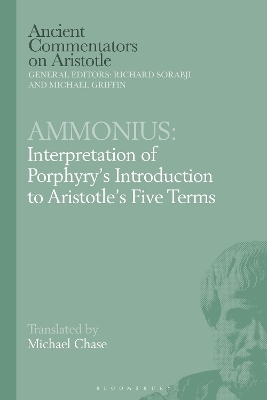
Ammonius: Interpretation of Porphyry’s Introduction to Aristotle’s Five Terms
Seiten
2021
Bloomsbury Academic (Verlag)
978-1-350-19132-7 (ISBN)
Bloomsbury Academic (Verlag)
978-1-350-19132-7 (ISBN)
One of his six introductions to philosophy, widely used by students in Alexandria, Ammonius' lecture on Porphyry was recorded in writing by his students in the commentary translated here. Along with five other types of introductions (three of which are translated in the Ancient Commentators on Aristotle volume Elias and David: Introductions to Philosophy with Olympiodorus: Introduction to Logic) it made Greek philosophy more accessible to other cultures. These introductions became standard in Ammonius’ school and included a popular set of five or more definitions of philosophy, some of them drawn from commentaries on quite different works.
Ammonius' lecture expounded the most celebrated and discussed previous introduction written by Porphyry 200 years earlier, which was devoted to five main technical terms of Aristotle’s logic. Ammonius was sympathetic to Porphyry because they both sought to harmonise the views of Plato and Aristotle with each other, arguing in different ways that the two philosophers did not disagree about the nature of universals. Porphyry's introduction was a hugely influential work for centuries after its composition, and this commentary by Ammonius served to maintain its position at the centre of later schools of philosophy.
This English translation of Ammonius' work is the latest volume in the Ancient Commentators on Aristotle series and makes this philosophical work accessible to a modern readership. The translation is accompanied by an introduction, comprehensive commentary notes, bibliography, glossary of translated terms and a subject index.
Ammonius' lecture expounded the most celebrated and discussed previous introduction written by Porphyry 200 years earlier, which was devoted to five main technical terms of Aristotle’s logic. Ammonius was sympathetic to Porphyry because they both sought to harmonise the views of Plato and Aristotle with each other, arguing in different ways that the two philosophers did not disagree about the nature of universals. Porphyry's introduction was a hugely influential work for centuries after its composition, and this commentary by Ammonius served to maintain its position at the centre of later schools of philosophy.
This English translation of Ammonius' work is the latest volume in the Ancient Commentators on Aristotle series and makes this philosophical work accessible to a modern readership. The translation is accompanied by an introduction, comprehensive commentary notes, bibliography, glossary of translated terms and a subject index.
Michael Chase is Adjunct Professor of Greek and Roman Studies at the University of Victoria, Canada, and Researcher at the Centre National de la Recherche Scientifique, Paris, France. He is author of two other volumes in the Ancient Commentators on Aristotle series: Simplicius: On Aristotle Categories 1-4 (Bloomsbury Academic, 2003), Simplicius: On Aristotle Physics 8.1-5 (with István Bodnár and Michael Share, Bloomsbury Academic, 2012).
Conventions
Abbreviations
Introduction
Textual Emendations
Translation
Notes
Appendix of Variant Readings
Bibliography
English–Greek Glossary
Greek–English Index
Subject Index
| Erscheinungsdatum | 26.03.2021 |
|---|---|
| Reihe/Serie | Ancient Commentators on Aristotle |
| Verlagsort | London |
| Sprache | englisch |
| Maße | 156 x 234 mm |
| Gewicht | 304 g |
| Themenwelt | Geisteswissenschaften ► Philosophie ► Metaphysik / Ontologie |
| Geisteswissenschaften ► Philosophie ► Philosophie Altertum / Antike | |
| ISBN-10 | 1-350-19132-9 / 1350191329 |
| ISBN-13 | 978-1-350-19132-7 / 9781350191327 |
| Zustand | Neuware |
| Haben Sie eine Frage zum Produkt? |
Mehr entdecken
aus dem Bereich
aus dem Bereich
Buch | Hardcover (2024)
Matthes & Seitz (Verlag)
CHF 41,90
Über konstruktivistisches Denken in der Theologie
Buch | Softcover (2024)
Verlag Herder
CHF 79,95


